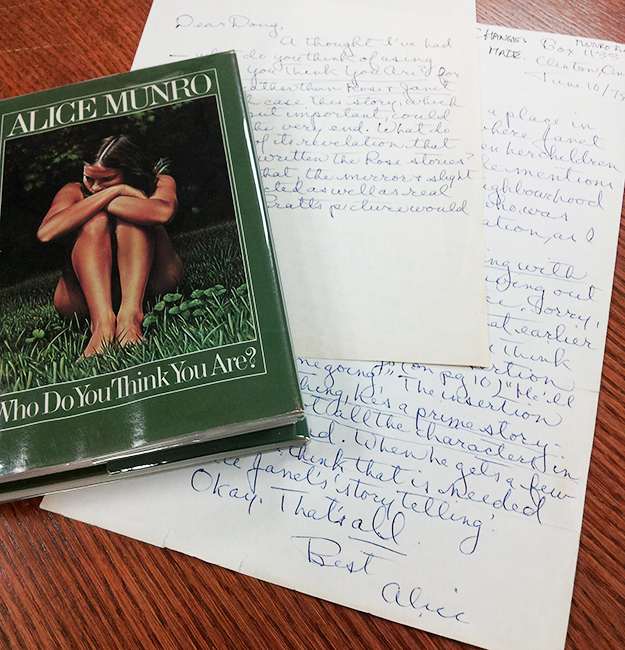McMaster archives home to detailed Alice Munro correspondence

Two handwritten letters from Nobel Prize winner Alice Munro to publisher Douglas Gibson outline some suggested changes to the 1978 book 'Who Do You Think You Are?' The letters, along with many others, are located in the William Ready Division of Archives and Research Collections at McMaster.
For the first time in the history of the award, a Canadian woman has received the Nobel Prize in Literature.
Alice Munro, one of the most celebrated and revered authors of her generation, was announced as this year’s recipient Thursday morning.
Interestingly, much of the professional correspondence between Munro and longtime publisher Douglas Gibson is housed right here on campus, in the William Ready Division of Archives and Research Collections.
“Douglas Gibson must be a very happy man today,” said Rick Stapleton, archives and research collections librarian at the University. “He’s been promoting her as a Nobel laureate for many years, and has always worked to raise her profile on the international stage.”
The collection contains numerous galley proofs, typescripts, chapter proofs and suggested revisions of Munro’s work from the late-1970s right up to the mid-2000s. Several handwritten letters from Munro to Gibson are also in the collection, including one from the author that suggests the title of Who Do You Think You Are? for her award-winning 1978 collection of short stories. Prior to that letter, the book was slated to be published as Rose & Janet.
Stapleton estimates that roughly 20 letters from Munro to her publisher are located in the Gibson collection, which is available for the McMaster community to browse.
Gibson joined Macmillan of Canada as editorial director in 1974, and became publisher five years later. He joined McClelland & Stewart as an editor and publisher in 1986, where he continued his working relationship with Munro and other Canadian authors such as Jack Hodgins, W.O. Mitchell and Robertson Davies.
Munro — a native of Huron Country and author of 14 celebrated original short story collections including Dance of the Happy Shades, The Progress of Love and her latest and final work, Dear Life — announced her formal retirement from writing in June. The 82-year-old is also a three-time winner of the Governor General’s Award for Fiction, and received the prestigious Giller Prize for 1998’s The Love of a Good Woman and again in 2004 for Runaway.
“The Nobel Prize confirms what many Canadians already know, and that’s how special she is,” said Lorraine York, a professor in the Department of English & Cultural Studies and an expert in contemporary Canadian literature.
According to York, longtime CBC producer Robert Weaver played an integral role in exposing Munro to the country’s literary elite during the early stages of her career, but it was the publication of several short stories in The New Yorker that truly helped raise her global profile. York, a lifelong fan of Munro’s, cites last year’s Dear Life as one of the author’s career-defining works.
“I think fans of Alice’s are always hoping to see one more book,” she explained. “She made the gesture of retirement before, and then Dear Life came out. There’s a cluster of stories towards the end that are incredibly moving, but at the same time, we have to recognize that she’s 82 years old and can’t work forever.”
The William Ready Division of Archives and Research Collections is located in the basement of Mills Memorial Library.


